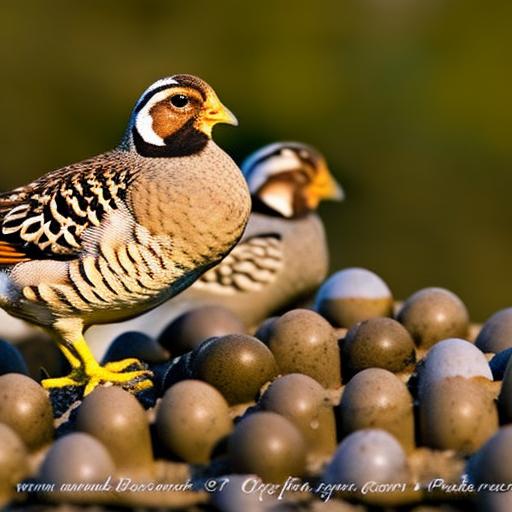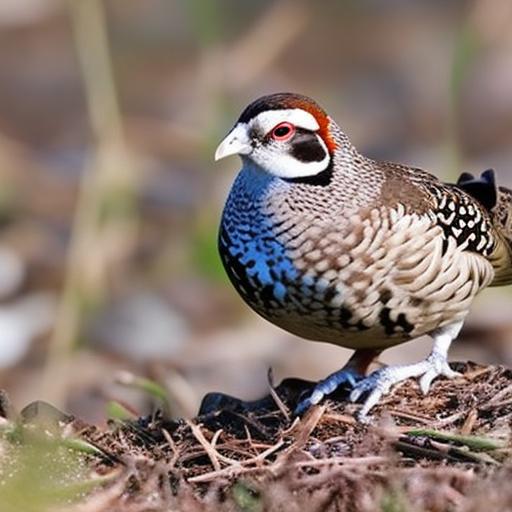Domestic quail breeds have been gaining popularity among poultry enthusiasts and small-scale farmers due to their small size, low maintenance requirements, and high-quality eggs and meat. Quails are small, ground-dwelling birds that belong to the pheasant family. They are known for their fast growth rate, high egg production, and adaptability to various climates and environments. Domestic quail breeds are typically raised for their eggs, meat, and sometimes for their attractive plumage. These birds are relatively easy to care for and can be a great addition to a backyard farm or homestead.
Quails are known for their gentle nature and can be easily tamed, making them suitable for small-scale poultry farming. They are also relatively quiet birds, making them ideal for urban or suburban settings where noise can be a concern. Domestic quail breeds come in a variety of colors and patterns, making them not only productive but also aesthetically pleasing. Whether you are interested in raising quails for their eggs, meat, or simply as pets, there are several popular domestic quail breeds to consider. In this article, we will explore some of the most popular domestic quail breeds, their characteristics, care requirements, breeding and reproduction, as well as common health issues and considerations for keeping these delightful birds.
Key Takeaways
- Domestic quail breeds are popular for their small size, low maintenance, and high egg production.
- Popular domestic quail breeds include Coturnix quail, Bobwhite quail, and Button quail.
- Domestic quail breeds are known for their fast growth, high egg production, and adaptability to various climates.
- Proper housing and care for domestic quail breeds include providing a secure enclosure, balanced diet, and clean water.
- Breeding and reproduction of domestic quail breeds require proper nesting areas, balanced diet, and monitoring for any health issues.
Popular Domestic Quail Breeds
1. Coturnix Quail (Japanese Quail): The Coturnix quail is one of the most popular domestic quail breeds due to its high egg production, fast growth rate, and relatively docile nature. They come in a variety of colors including brown, white, tuxedo, and silver, making them a visually appealing addition to any flock. Coturnix quails are known for their prolific egg-laying ability, with some hens laying up to 300 eggs per year. They are also prized for their tender and flavorful meat, making them a popular choice for small-scale meat production.
2. Bobwhite Quail: The Bobwhite quail is native to North America and is known for its distinctive call that sounds like “bob-white.” They are popular among hunters for their game bird qualities and are often raised for hunting preserves and sporting events. Bobwhite quails are also raised for their eggs and meat, although they have a slower growth rate compared to Coturnix quails. They are typically brown with white markings and are known for their hardiness and adaptability to various climates.
3. Button Quail: Button quails, also known as Chinese painted quails, are the smallest of the domestic quail breeds and are often kept as pets or for ornamental purposes. They come in a variety of colors and patterns, making them a favorite among bird enthusiasts. Button quails are known for their active and social nature, often forming close bonds with their flock mates. While they are not as prolific egg layers as Coturnix quails, they are still valued for their small, speckled eggs and charming personalities.
Characteristics of Domestic Quail Breeds
Domestic quail breeds share several common characteristics that make them attractive options for small-scale poultry farming. Quails are small birds, typically weighing between 4-7 ounces, with compact bodies and short legs. They have a plump appearance and are known for their rapid growth rate, reaching maturity in as little as 6-8 weeks. Quails have a diverse range of plumage colors and patterns, including brown, white, tuxedo, silver, and various shades of speckling and spotting.
In terms of behavior, domestic quail breeds are generally docile and non-aggressive towards humans, making them easy to handle and manage. They are also relatively quiet birds, emitting soft cooing sounds and occasional chirps, making them suitable for urban or suburban settings where noise can be a concern. Quails are ground-dwelling birds and prefer to spend most of their time foraging for food on the ground. They are also known for their strong flying abilities, although they typically prefer to stay close to the ground.
Quails are prolific egg layers, with hens laying an average of 200-300 eggs per year, depending on the breed. Their eggs are small but nutritious, with a high yolk to white ratio and a delicate flavor. Quail meat is also highly prized for its tenderness and rich flavor, making it a popular choice for gourmet dishes and culinary enthusiasts. Overall, domestic quail breeds are valued for their small size, low maintenance requirements, high productivity, and adaptability to various climates and environments.
Care and Housing of Domestic Quail Breeds
When it comes to caring for domestic quail breeds, there are several key considerations to keep in mind to ensure the health and well-being of these delightful birds. Quails require a suitable housing setup that provides adequate space, protection from predators, good ventilation, and easy access to food and water. A well-ventilated coop or aviary with a solid floor is essential to protect quails from predators such as rats, snakes, and birds of prey.
Quails are ground-dwelling birds that prefer to spend most of their time foraging for food on the ground. Therefore, providing a suitable substrate such as sand or wood shavings in their housing setup is important to mimic their natural environment. Quails also require access to fresh water at all times, so it’s important to provide them with a reliable water source that is kept clean and free from contaminants.
In terms of diet, domestic quail breeds require a balanced diet that includes a high-quality commercial feed supplemented with fresh greens, fruits, vegetables, and grit. Quails are omnivorous birds that will eagerly consume insects, worms, seeds, and small fruits as part of their natural diet. Providing them with access to a varied diet will help ensure that they receive all the essential nutrients they need to thrive.
Overall, providing a suitable housing setup with ample space, good ventilation, protection from predators, access to fresh water, and a balanced diet is essential for the care and well-being of domestic quail breeds.
Breeding and Reproduction of Domestic Quail Breeds
Breeding domestic quail breeds can be a rewarding experience for poultry enthusiasts and small-scale farmers. Quails reach sexual maturity at around 6-8 weeks of age and can start laying eggs shortly thereafter. To encourage successful breeding and reproduction, it’s important to provide quails with a suitable nesting area that is dark, quiet, and secluded.
Quails are prolific egg layers, with hens laying an average of 200-300 eggs per year depending on the breed. Their eggs are small but nutritious, with a high yolk to white ratio and a delicate flavor. Collecting eggs regularly from the nesting area will help prevent them from being damaged or eaten by the hens.
When it comes to incubating quail eggs, there are several options available including using a broody hen or an artificial incubator. Quail eggs typically have an incubation period of 17-18 days before they hatch into adorable chicks. Once the chicks hatch, they will require a warm and draft-free environment with access to fresh water and chick starter feed to ensure their health and well-being.
Overall, breeding domestic quail breeds can be a fulfilling endeavor that allows poultry enthusiasts to experience the joy of raising these charming birds from egg to chick to adult.
Health and Common Issues of Domestic Quail Breeds

Like all poultry species, domestic quail breeds are susceptible to certain health issues that can impact their well-being if not properly managed. Common health issues that may affect quails include respiratory infections, parasites such as mites and lice, nutritional deficiencies, injuries from predators or aggressive flock mates, and reproductive disorders.
To ensure the health and well-being of domestic quail breeds, it’s important to provide them with a clean and well-maintained housing setup that is free from drafts, dampness, and contaminants. Regularly cleaning the coop or aviary, providing fresh bedding material, and ensuring good ventilation will help prevent respiratory infections and parasitic infestations.
Quails also require access to a balanced diet that includes a high-quality commercial feed supplemented with fresh greens, fruits, vegetables, and grit. Providing them with access to a varied diet will help ensure that they receive all the essential nutrients they need to maintain good health.
Regularly monitoring the flock for any signs of illness or injury is important so that any issues can be promptly addressed. Working with a veterinarian who has experience with poultry can be beneficial in developing a health management plan for your domestic quail breeds.
Overall, by providing a clean and well-maintained housing setup, access to a balanced diet, regular monitoring for signs of illness or injury, and working with a veterinarian when needed, you can help ensure the health and well-being of your domestic quail breeds.
Conclusion and Considerations for Keeping Domestic Quail Breeds
In conclusion, domestic quail breeds are charming birds that offer small-scale farmers and poultry enthusiasts the opportunity to enjoy fresh eggs, flavorful meat, or simply the pleasure of raising these delightful birds as pets. With their small size, low maintenance requirements, high productivity, adaptability to various climates and environments, as well as their gentle nature and attractive plumage colors and patterns, domestic quail breeds have much to offer.
When considering keeping domestic quail breeds, it’s important to provide them with a suitable housing setup that offers ample space, protection from predators, good ventilation, access to fresh water, and a balanced diet. Regular monitoring for signs of illness or injury is also important to ensure the health and well-being of these charming birds.
Whether you are interested in raising quails for their eggs or meat production or simply as pets or ornamental birds, there are several popular domestic quail breeds to consider including Coturnix quails, Bobwhite quails, and Button quails. By understanding their characteristics, care requirements, breeding and reproduction considerations as well as common health issues and management strategies, you can create a rewarding experience raising domestic quail breeds on your farm or homestead.
If you’re interested in learning more about raising domestic quail breeds, you might also want to check out this insightful article on creating a garden chicken coop at Poultry Wizard. It offers valuable tips and advice on providing a suitable environment for your poultry, which can be beneficial for quail as well.
FAQs
What are domestic quail breeds?
Domestic quail breeds are varieties of quail that have been selectively bred for traits such as egg production, meat quality, or ornamental purposes. These breeds are typically raised in captivity for agricultural or hobbyist purposes.
What are some popular domestic quail breeds?
Some popular domestic quail breeds include the Coturnix quail (also known as Japanese quail), Bobwhite quail, Gambel’s quail, and California quail. Each breed has its own unique characteristics and is suited for different purposes.
What are the differences between domestic quail breeds?
Domestic quail breeds differ in terms of size, coloration, egg production, meat quality, and temperament. Some breeds are known for their prolific egg-laying abilities, while others are prized for their meat production or ornamental plumage.
What are the uses of domestic quail breeds?
Domestic quail breeds are primarily used for egg and meat production. Their small size and rapid growth make them an efficient source of protein for small-scale farming operations. Additionally, some breeds are kept for ornamental purposes due to their attractive plumage.
How are domestic quail breeds raised?
Domestic quail breeds are typically raised in enclosed pens or aviaries to protect them from predators. They require a balanced diet of commercial quail feed, supplemented with fresh greens and protein sources. Proper housing, temperature control, and sanitation are essential for their health and productivity.
Meet Walter, the feathered-friend fanatic of Florida! Nestled in the sunshine state, Walter struts through life with his feathered companions, clucking his way to happiness. With a coop that’s fancier than a five-star hotel, he’s the Don Juan of the chicken world. When he’s not teaching his hens to do the cha-cha, you’ll find him in a heated debate with his prized rooster, Sir Clucks-a-Lot. Walter’s poultry passion is no yolk; he’s the sunny-side-up guy you never knew you needed in your flock of friends!







